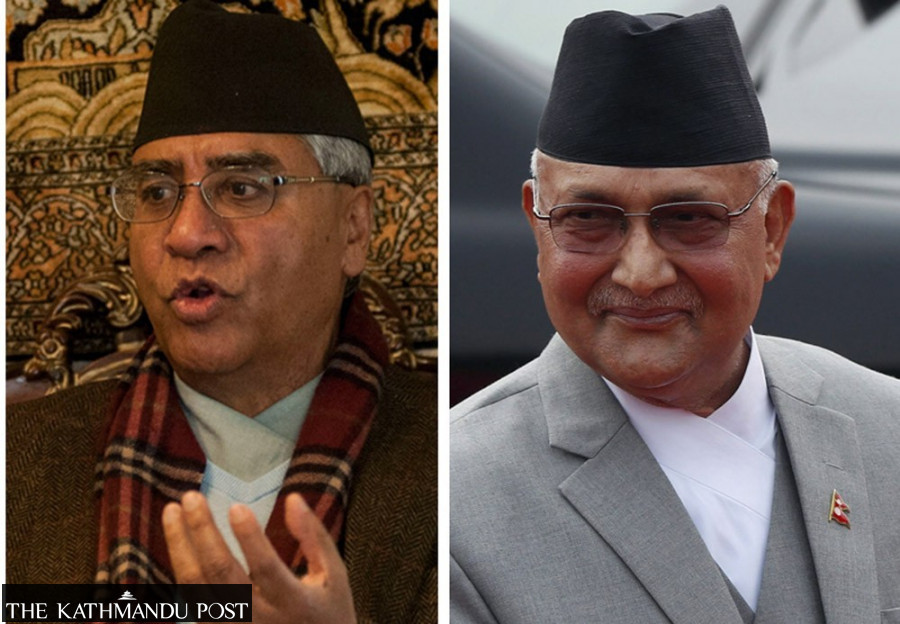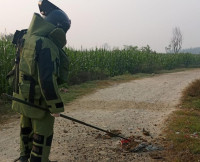National
Deuba responds to Oli’s boundary barb, emphasises dialogue over diatribe
KP Oli had lambasted the ruling alliance for its silence on the boundary issue and accused them of surrendering to India.
Post Report
A day after former prime minister and CPN-UML Chairman KP Sharma Oli kicked off his election campaign from Darchula and attacked the Sher Bahadur Deuba government for its failure to bring back Nepali lands encroached by India, Deuba took a potshot at Oli on his boundary statement.
Dropping a strong hint that the UML intends to contest the upcoming elections on a nationalistic plank, Oli, who has been declared a star campaigner by his party, vowed that his government would not allow encroachment of a single inch of its land.
“We issued the national map [incorporating the Kalapani area]. The Parliament endorsed it, unanimously. I am here to guarantee that [the area returns to Nepal],” Oli told a public rally in Darchula on Friday.
The UML in its manifesto has also pledged that the party will try to bring back Limpiyadhura, Lipulekh and Kalapani that are currently occupied by India.
When Oli was the prime minister, he issued a new map of Nepal in May 2020, incorporating Limpiyadhura, Lipulekh and Kalapani, which fall in the Darchula district. The move had followed New Delhi’s release of a new map in November 2019 showing the areas as part of the Indian territory.
The cartographic war between Nepal and India brought down bilateral ties to an all-time low. In one of its statements, New Delhi rejected Kathmandu’s territorial enlargement through the issuance of the new map.
Responding to Oli’s campaign speech, Prime Minister Deuba said that making a statement in Darchula won’t help a bit.
“We are trying to bring back the disputed land through diplomatic talks,” Deuba said, while addressing a mass gathering in his hometown, Dadheldhura, on Saturday.
“We cannot bring back Limpiyadhura simply by giving a speech in Darchula,” Deuba said. “Only diplomatic talks will help us reclaim our land. Otherwise, we’d have to fight a war with India.”
Deuba added that Nepal would talk to India to resolve the boundary row.
After India unveiled its new political map in November 2019, showing the Nepali territory as its own, Kathmandu objected to the move and called for the settlement of the issue through talks. India ignored the appeal saying that talks would start only when the Covid pandemic died down.
Nepal was insistent on early talks at the diplomatic and political levels—which didn’t happen. The issue took a back seat owing to internal disputes in the ruling Nepal Communist Party (NCP) and the pandemic.
After Deuba became prime minister in July 2021, he again took up the matter with the Indian Prime Minister Narendra Modi during his official visit to India in April.
However, there has been no substantive progress in the matter, say Nepali officials.
Both the major political parties and even some other forces have vowed to take back the disputed land from India through dialogue, in their respective manifestos.
Additionally, the Nepali Congress even said that the boundary dispute with China that was reported in Humla district would be settled. But other parties are silent on the boundary dispute with China in Humla.
Oli, on Saturday, lambasted the ruling alliance for its silence on the boundary issue and accused them of surrendering to India. Responding to Oli's repeated calls for failing to take up boundary issues with India, former prime minister and Nepal Samajwadi Party Chairman Baburam Bhattarai said that territorial integrity cannot be an election issue.
"The country’s territorial integrity is and should be an indisputable issue for all citizens and parties, not just a party or an individual,” wrote Bhattarai on social media. “If someone raises it for electoral interests, we should see through it then. Let us not forget that King Mahendra in Nepal and Hitler in Germany caused upheavals under the guise of nationalism".
Experts say though parties and leaders have divergent views on boundary issues ahead of the elections, they should have one voice after the elections in order to settle the long-standing disputes.
Political parties raise boundary disputes ahead of the elections, which most of them even include in their manifestos, said Nilamber Acharya, former Nepali ambassador to India.
Acharya said that after the elections and formation of a new government, there must be one voice, one policy and one position among all parties in order to settle the border disputes.
Acharya was the Nepali ambassador in New Delhi when the boundary issue resurfaced with India.
“Once the new government is formed after the elections, the boundary issue can be taken towards a final settlement,” he said.




 22.59°C Kathmandu
22.59°C Kathmandu














